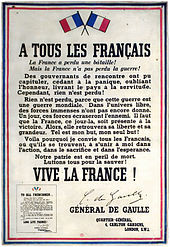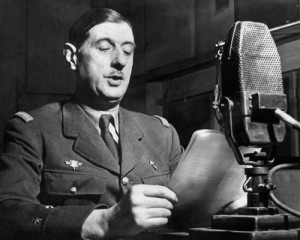
Looking Back in History: The Public Diplomacy of Free France During WWII
By Paul Rockower
 I have always been fascinated by the way that countries with issues of diplomatic recognition, and national movements, conduct public diplomacy to communicate their diplomatic legitimacy or to bypass diplomatic difficulties. To such ends, I was a Visiting Fellow at the Taiwan Foundation for Democracy, analyzing how Taiwan uses public diplomacy to get beyond its diplomatic complications. I have also examined the public diplomacy outreach of Kurdistan and its diaspora, as well as that of Somaliland.
I have always been fascinated by the way that countries with issues of diplomatic recognition, and national movements, conduct public diplomacy to communicate their diplomatic legitimacy or to bypass diplomatic difficulties. To such ends, I was a Visiting Fellow at the Taiwan Foundation for Democracy, analyzing how Taiwan uses public diplomacy to get beyond its diplomatic complications. I have also examined the public diplomacy outreach of Kurdistan and its diaspora, as well as that of Somaliland.
While presently on sabbatical in Paris, I came across the Musèe LeClerc in Montparnasse, at the beautiful Jardin Atlantique. The Musèe LeClerc is dedicated to the French general who helped liberate Paris. The museum examines the general history of World War II from the Free French perspective, as well as looking at the military career of General leClerc and his role in liberating the French capital from Nazi occupation.
The museum engagingly documents the Free French forces’ struggle through video, pictures and communiqués. One such document was the letter by General de Gaulle, heralding the emergence of the Free French Forces:
To all Frenchmen..
France has lost a battle!
But France has not lost the war!
A makeshift government may have capitulated, giving away to panic, forgetting Honor, delivering their country into slavery.
Yet nothing is lost!
Nothing is lost because this is a world war. In the free universe immense forces have not yet been brought into play. Some day these forces will crush the enemy. On that day France must be present at the Victory! She will regain her liberty and her greatness.
That is my goal, my only goal!
That is why I ask all my Frenchmen, wherever they may be, to unite with me in action, in sacrifice and in hope.
Our country is in danger of death. Let us fight to save it!
Long live France!
General De Gaulle
Quarter General
4,Carlton Guards
London, S.W.I.
Voila! And there you have the beginning of Free France’s public diplomacy efforts in the efforts of General De Gaulle to project authority and legitimacy as the leader of a Free France, as well as the public diplomacy of the Free French to project their role in the ongoing war effort.
 From the letter, De Gaulle’s intent is clear: offer leadership, focus and direction to those in France under occupation still ready to fight the calamity that has befallen France, and for the French colonial empire not under Nazi occupation or Vichy control. A communication to the nation of France worldwide, and also a declaration of public diplomacy to the above mentioned, “immense forces have not yet been brought into play.” Such a letter is a significant act of public diplomacy, as one can only assume that those immense forces not yet on the battlefield include the United States.
From the letter, De Gaulle’s intent is clear: offer leadership, focus and direction to those in France under occupation still ready to fight the calamity that has befallen France, and for the French colonial empire not under Nazi occupation or Vichy control. A communication to the nation of France worldwide, and also a declaration of public diplomacy to the above mentioned, “immense forces have not yet been brought into play.” Such a letter is a significant act of public diplomacy, as one can only assume that those immense forces not yet on the battlefield include the United States.
After this letter, and just a day after Marshal Pétain addressed France to announce the armistice and acceptance of defeat, De Gaulle took to the airwaves of the BBC—the British international broadcasting arm. With his famous appeal on June 18, 1940 (as well as a subsequent broadcast four days later) to the French people, De Gaulle exhorted France to understand that the nation was not yet vanquished. The French general declared that the Free French had the support of the British Empire and would have the support of an America still on the sidelines. De Gaulle even reportedly received broadcasting technique lessons from journalist and future chief of American public diplomacy, Edward R. Murrow in London.
From there, the Free French Forces set up the trappings of legitimacy as a governing body as it consolidated gains in French Gabon and French Equatorial Africa. In addition to setting up their own newspapers like Le Cameroun Libre (Oorgane de francais libre de Cameroun), they also minted their own notes, the Afrique Francaise Libre. Meanwhile from Britain and later Algiers, the Free French carried out their own international broadcasting efforts aimed at shoring up support “domestically” among the French under occupation and under the Vichy regime (as conversely did the Vichy Regime).
While De Gaulle and the United States government had a complicated relationship (putting it mildly), borne out of the initial U.S. recognition of Vichy France, there were significant grassroots people-to-people connections between the partisans of the Free French and the American people.
On August 26, 1940, Eugène Houdry, a French chemist living in America, helped create the association France Forever in Philadelphia to support Free France in America. The France Forever association conducted public diplomacy to rally support for the Free French in America. France Forever created 44 chapters in American cities, and at its height had over 9,000 members—mostly American but with many of the political committees made up of French war refugees. France Forever helped disseminate information via monthly magazines and bulletins, pamphlets, radio shows and demonstrations on behalf of Free France and helped burnish the image of General Charles De Gaulle to the American public.[1]
And De Gaulle conducted outreach through high-level surrogates to an America still on the sidelines, as a leader of a force of France that could redeem the nation.[2] From the communication efforts undertaken, it can be perceived that De Gaulle and the Free French forces were also using public diplomacy to reach out to American policy makers and opinion-shapers to help support the Free French cause, especially to help deliver it much-needed arms. Perhaps the culmination of this public diplomacy outreach to gain access to arms came with the signing of the Lend-Lease Agreement. The Musèe LeClerc notes:
By the law of Match 11, 1941, the United States is allowed to provide supplies to any state whose defense is necessary for the security of the USA. They, therefore, become the true arsenal of democracy desired by Roosevelt. This did reach the Free French via British lines. After November 1942, it is extended to the Fighting French by the United States. This aid ends with the war but anticipates the future Marshall Plan.
While it is difficult to create a line directly linking these efforts to the direct material support of the U.S. Lend-Lease Agreement, it cannot be discounted in the overall efforts to rally America to support the Free French forces.
De Gaulle and Free France’s use of public diplomacy to rally a down-yet-not-out France remains a stirring example of how a semi-official national movement can project legitimacy and rally support for its cause. Through leaflets, communiqués, and international broadcasting efforts, as well as by projecting the trappings of authority, Free France was able to use public diplomacy to rally support domestically and throughout the areas of the French territory worldwide still under contest, as well as to supporters in Britain and the United States. The public diplomacy practices conducted by Free France, as documented by the Musèe LeClerc, remains an important public diplomacy lesson even today.
[1] Raoul Aglion, “The Free French and the United States from 1940 to 1944,” in eds. Paxton and Wahl, De Gaulle and the United States, (Berg Publishing, Oxford) 1994
[2] ibid






[…] Looking Back in History: The Public Diplomacy of Free France During WWII Paul Rockower De Gaulle and Free France’s use of public diplomacy to rally a down-yet-not-out France remains a stirring example of how a semi-official national movement can project legitimacy and rally support for its cause. […]
[…] The article originally appeared on the ASP website, available here. […]
[…] Looking Back in History: The Public Diplomacy of Free France During WWII […]